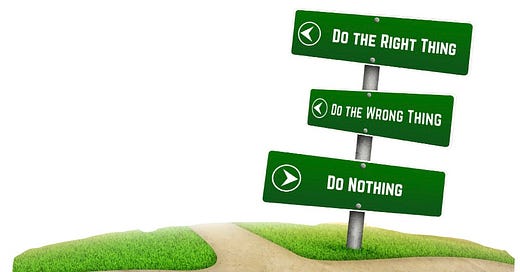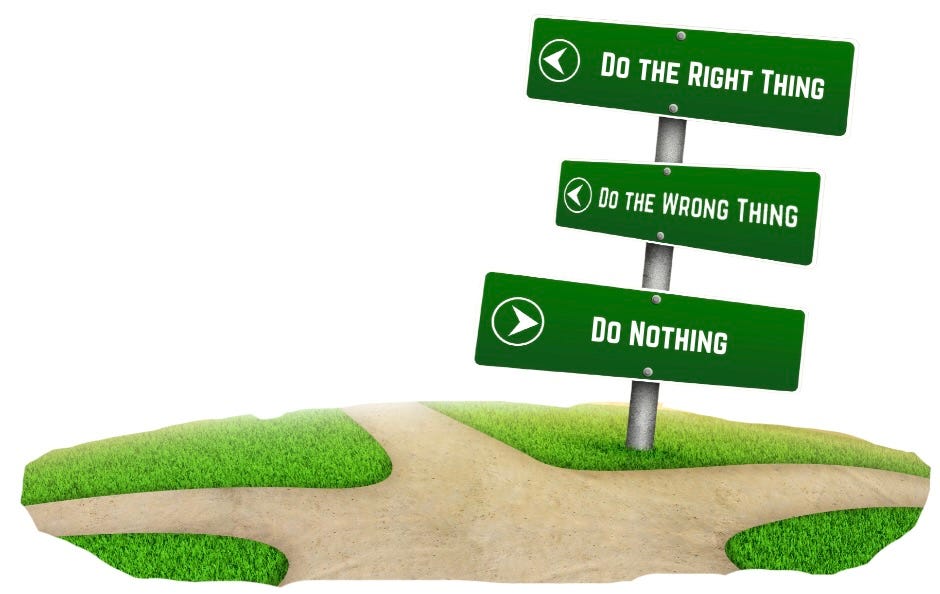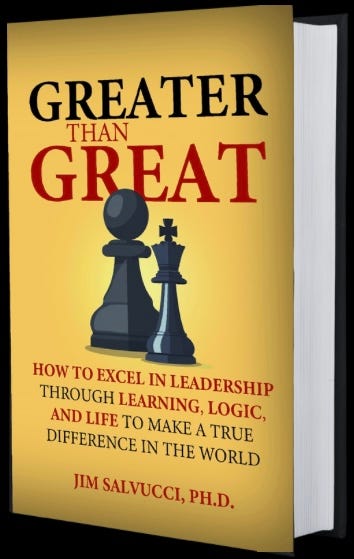The only thing necessary for the triumph of evil is that good men do nothing.
Let’s play pretend. Imagine you need to return something to the grocery store. Maybe you excitedly bought a dozen kumquats, licking your lips in anticipation of their tart-sweetness on your tongue, but they turned moldy right away. Disgusting.
You indignantly march back to the store with the rotten kumquats and a slightly crumpled receipt to demand a refund. The manager—really just a bratty teenager—scoffs, “Look, the receipt’s not itemized. How do I know you bought these kumquats here?” You snatch back the receipt and peruse it. Sure enough, in the harsh glare of the fluorescent lights you see that the receipt simply reads, “STUFF,” and states the total cost. No kumquats, persimmons, lychees, gooseberries, rambutans, mangosteens, cherimoyas, or any of your other rather oddball fruit purchases from the day before are listed.
“But I just bought these kumquats here just yesterday, and they’re already moldy,” you protest.
The punk manager shrugs and, smirking, points to a sign that reads, “No returns without an itemized receipt.”
In frustration and hoping for an ally, you turn to the customer behind you—a middle-aged woman in a track suit—and ask, “Can you believe this?”
She barely looks up from her phone and snarls, “Get a move on! Some of us have places to be.”
Exiting the store thoroughly defeated and demoralized, you realize that as angry as you are at the manager, it was the woman who really teed you off. You think, “Is there anything worse than indifference in the face of injustice?”
Making a Difference in the Cause of Justice
That scenario is a scaled-down, low-stakes version of what my friend Carol once dealt with. As a public defender, Carol had to unravel a real injustice—an entire courthouse violating basic Constitutional rights. The judges were allowing prosecutors to enter substances into evidence as illegal drugs without sufficient proof they were indeed illegal drugs. Instead, they just submitted a summary of the lab testing. Sort of like your receipt that read, “STUFF.”
Consider the basics of this situation. If you’re arrested for a crime that requires expert analysis—drugs, DNA, blood-alcohol level, etc.—the government has an absolute duty to provide the defense and the court thorough and accurate evidence. A mere summary is a wholly inadequate substitute.
Why, you ask? With only a summary, the defense has no ability to assess or challenge the lab testing, which—quite frankly—sometimes erred and was just plain wrong. For Carol’s clients, this meant jail time—no matter whether they were caught with opioids or blood-pressure pills.
Moldy kumquats seem like a treat by comparison.
To put this scenario into perspective, imagine getting a speeding ticket, but no one can say if the radar is accurate. Or, being arrested for DUI, but no one knows whether the breathalyzer has ever been calibrated.
The defense stands as the last bastion against such courtroom abuse, and it’s the same with controlled substances. The defense has a duty to hold the state to the highest standard on every issue. Otherwise innocent people will lose their freedom.
Carol took it upon herself to consult with forensics experts on what proof was necessary to say a drug was illegal. She then developed a motion demanding precisely those standards be met, which she boldly filed in every case she had involving drugs, which numbered a lot.
You might think that Carol’s fellow public defenders and their supervisors would welcome and even celebrate her efforts. Instead, most were plainly indifferent, asking, “Why stir the pot?” Others openly resented her, demanding that she “just let it go.” After all, many of these public defenders and especially their bosses were more desperate to stay on the good side of the surly judges than to look out for their clients.
Although Carol had to face down those nasty judges and corner-cutting prosecutors every day, she persisted. Even though she regularly ticked off her own apathetic colleagues and cowering supervisors, she persisted. Much as she hated the stress of being the bad guy for doing the right thing, she persisted. For many, many months.
Meanwhile, countless innocent people in any number of cases certainly went to jail. Their lives were destroyed. Not only did they lose their freedom, but they lost their families, their jobs, and their ability to get jobs in the future.
Now imagine if Carol’s fellow public defenders had the guts to stand alongside her. Or, what if her bosses had her back? (After all, it was only their professional and ethical obligation.) How much more quickly could this miscarriage of justice have been resolved?
No, their feeble indifference only gave cover to the court’s abuses. Without their support, Carol came across as a rogue crank with an axe to grind—easily dismissed.
Still, as horrible as the judges and prosecutors had been, the betrayal by Carol’s colleagues was far worse. Carol, the best among them, felt alienated and vulnerable. Even though her tenacity eventually paid off, she soon left that job that she was so excellent at without regret, never to look back.
The Agony of the Neutrals
The author, Holocaust survivor, and Nobel laureate, Elie Wiesel, said, “Indifference is always the friend of the enemy, for it benefits the aggressor—never his victim, whose pain is magnified when he or she feels forgotten. The political prisoner in his cell, the hungry children, the homeless refugees—not to respond to their plight, not to relieve their solitude by offering them a spark of hope is to exile them from human memory. And in denying their humanity, we betray our own. Indifference, then, is not only a sin, it is a punishment.”
The moral of this statement is a favorite theme for Wiesel—that indifference, neutrality, and inaction, not evil, are the primary sources of oppression and suffering in the world.
It’s an old idea. The Roman philosopher and emperor, Marcus Aurelius, noted, “You can also commit injustice by doing nothing.”
And, in The Inferno, Dante reserves a special place for those who sided neither with good nor evil:
Forthwith I comprehended, and was certain, That this the sect was of the caitiff wretches Hateful to God and to his enemies.
Spurned and shunned by both God and Satan and welcome nowhere, these “caitiff wretches” or cowardly scoundrels dwell outside the gates of Hell, perpetually plagued by biting insects while chasing a banner that zips about every which way. It’s a decidedly acute torment devised particularly for the opportunistic neutrals—those who stand for nothing and follow wherever the wind might blow.
Why do moralists as diverse as Aurelius, Wiesel, and Dante hold the uncommitted in such disdain? After all, you’d think, for instance, that Wiesel would single out his Nazi tormentors for vilification, but no. The neutrals—the ones who sit it out—earn his highest scorn.
Some of these neutrals are—as Dante suggests—simply afraid to commit to the wrong side. Others, though, “don’t want to get involved.”
And, the worst tout their craven indifference as some sort of principled stand against negativity or confrontation, whining, “Why can’t you just let it go?” “It,” of course, being nothing less than duty and justice. Don’t believe their self-righteous BS for a second even if they thoroughly believe it themselves.
You can see this obnoxious behavior throughout history and on the current world stage. You can also see it play out in the workplace, where the neutrals give the most egregious bosses license to go on wreaking havoc unchecked.
Now to be fair, I want to acknowledge that sometimes neutral folks are legitimately frozen in trauma or fear or are genuinely vulnerable and need to protect themselves. These people have my genuine compassion, but they’re not my concern here.
My focus is entirely on those for whom neutrality is both a manifestation of their cowardice and a strategy or ploy to shirk moral responsibility or even to curry favor. They aren’t exactly sycophants, but—like it or not—they are apologists, even if only tacitly. They’re also the first to commit the cardinal sin of obeying in advance.
Don’t Just Have Ethics, Do Them
Carol’s story demonstrates that being ethical is not some static state. Ethics is a behavior—active, never passive. Laying low, sitting it out, and keeping your head down won’t preserve your ethical status. Indeed, not intentionally defending what is right is, by definition, plain wrong. And, just being good or having goodness inside is not good enough. You must actively seek to do good.
Aristotle offers some of my favorite wisdom on the subject of active goodness:
We become just by doing just acts, temperate by doing temperate acts, brave by doing brave acts.
Never can you become just, temperate, brave, or good simply by standing around doing nothing no matter what you feel in your heart.
Therefore, if you want to become an ethical person, act ethically. Ethics is a do, not a be. Don’t behave like Dante’s “caitiff wretches”—the neutrals. Moreover don’t act like Carol’s colleagues—those cowardly public defenders and their bosses. As they amply illustrate, when supposedly good people do nothing, innocent people get hurt, including those—like Carol—committed to doing the right thing.
Great leaders act. They strive to do good—to do both good work and good works. Everything else they leave to the neutrals—those chronically indifferent, morally gutless, and ethically spineless “caitiff wretches”—the chief enemy of the good.
When they—the neutrals—sit down, you know it’s time for the leaders to stand up.
How often have you been tempted to sit it out? What do you do to ensure that you rise up in the face of injustice or to meet a need?
Great leaders strive to never sit it out but develop the tenacity to do their duty and face down injustice, and I can help.
Unlock the Great Leader Within! Download my free resource, the Transform To GREATness Toolkit, now!
I look forward to hearing from you.
Intro and outro podcast theme music by LiteSaturation from Pixabay.
Have you noticed that my podcast sound has improved in recent months?
I use Descript to record and edit my podcast, and—if you record sound and video—so should you. Descript has transformed my process and improved my recordings. Now editing is a breeze!
Interested? Use my affiliate link to try Descript for free: https://get.descript.com/t8zotbxmi6ds.
Let me know if you try it out and what you think.
Need a speaker or a podcast guest? Invite me!
Need an engaging and experienced speaker for your event? Check out my Speaker’s Page.
Looking for a compelling podcast guest? Check out my Podcast Guest Page.
I’m Dr. Jim Salvucci, an author, keynote speaker, coach, and consultant. I served higher education for 30 years as an English professor, dean, and vice president before founding Guidance for Greatness to guide young bosses to become the next generation of great leaders. I’m a certified Tiny Habits coach as well as a certified Thrive Global coach and life coach and hold leadership certificates from Harvard University and the Council of Independent Colleges in addition to my Ph.D. from the University of Toronto. Central to my leadership philosophy is that all great leaders are decent humans as well as great teachers, guiding their people and their organizations through values toward success. My goal is to guide today’s young leaders to become the next generation of great leaders by offering practical strategies on values-driven leadership.
Look for my new book, Greater than Great: How to Excel in Leadership through Learning, Logic, and Life to Make a True Difference in the World, in early 2025!

















Share this post